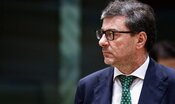“We continue to believe that the objective of 1%” of GDP growth this year “is realistic and if it is not 1% it will be very very close to that result”. Economy Minister Giancarlo Giorgetti outlines the path for the next budget, in an interview with Bloomberg. “Today the trend confirms these expectations” even if “it is clear that the international situation will in some way affect the world economy and our country’s”. Furthermore, “the not particularly happy performance of an economy like the German one impacts a lot of Italian supply”. In this context, “manufacturing and industry are not doing well but are more than compensated for by services” and if “it is clear that all of old Europe is not growing according to expectations, we are doing better than others”. Then he underlines: “In the budget law we will mainly cut spending, but there will certainly be a competition regarding revenue. There will be a call for contributions for everyone, not simply for the banks, but a reasoned and rational one.”
The next budget should be around 25 billion euros. The owner of the Mef has repeatedly remarked that resources are limited and constrained by the deficit reduction plan. Yesterday during the last meeting of the Council of Ministers, Giorgetti apparently hinted that, if the spending cuts from individual ministers do not arrive, he will have to do it. “We are engaged in a particularly demanding path to the return, we have announced that we will drop below 3% in 2026 while others such as France will do so in 2029”, continued the minister. “Does this mean taxing extra profits? In my opinion it is an incorrect term. Companies do not give to charity, voluntary contributions do not exist. There is Article 53 of the Constitution which provides that everyone contributes according to their possibilities. Taxes are made on profits to those who made them, profits must be determined correctly and I am convinced that in the end we will find a balanced solution”. Qualified sources clarify that as regards revenue it means that an effort will be asked from larger companies operating in certain sectors in which profits have benefited in some way from favorable external conditions so that they contribute in ways which are being discussed. It is clarified that no new taxation for individuals is being studied while smaller companies are already interested in the biennial preventive composition agreement.
As for the privatization chapter, “we already have some operations in the pipeline, it will be a particularly busy autumn-winter, we will go to the Post Office tranche already announced, then there will be another of MPS. In reality, in this defined privatization program we are bringing order and rationalizing the forms of State intervention”. Giorgetti reiterated the “serious, prudent and responsible” approach to public finances, almost a mantra since he has been at the helm of the Mef. Then he concluded: “I believe that credibility is fundamental, this government must send a message of credibility, we then do what we promise“. The central nucleus of the next budget law will be the confirmation of the cut in the tax wedge up to 35 thousand euros and the reduction of the Irpef rates to three. The two measures cost 15 billion euros. Then there is the hypothesis of expanding the cutting the wedge also for the middle class, incomes up to 60 thousand euros, but to do so it is estimated that between 2.5 and 4 billion will be needed. Together with the confirmation of the measures of the last budget, the executive aims to increase funding for healthcare .
Today some newspapers are relaunching a passage of the Structural Plan which talks about “using the reorganization of tax expenditures in certain areas of taxation, such as the alignment of excise duty rates for diesel and petrol”. The Mef, in a note, defined the news according to which the Government intends to increase excise duties on fuel as “completely misleading”. The Treasury recalls that “on the basis of the Pnrr commitments, the specific recommendations of the European Commission and the Plan for the ecological transition approved in 2022, the Government is required to adopt measures aimed at reducing harmful environmental subsidies”. A mechanism for aligning the levels of the respective excise duties is being studied, continues the note, but “the intervention is not will result in the simplistic choice of raising excise duties on diesel to the level of those on petrol, but rather in a remodulation of the two”.

Online Lottery: Is It Worth the Risk? – Miraef
Online Real Cash Poker – What You’ve To To Know To Start – Nearpy
Just a moment…
Atividade – christiannapier – Ei Nerd
[PT2021] Mengapa Raja123 Menjadi Pilihan Utama di Dunia Perjudian
Sengtoto: Situs Slot Gacor Terkini Dengan Rtp Tinggi Dan Peluang Jackpot Besar
Raja99: Pengalaman Judi Slot Online Terbaik by kandicedodd on DeviantArt
koririvers – Perfil – Blogueira Bia Franco Fórum
Play Crypto Or Bitcoin Poker Online – Praise The Sun
homermarrero – Users – RCIIMS
Big Hoki: Tempat yang Tepat bagi Penggemar Perjudian Slot
Just a moment…
@ninacates | Varecha.sk
IVRPA
extension.unimagdalena.edu.co/extension/Lists/Contactenos/DispForm.aspx?ID=1702802
robynmuller – Users – RCIIMS
jacintakramer
keithsalinas's Reposts | Mixcloud
Menjelajahi Perjudian Slot Online: Rasakan Slot 5000 – Gaming News
Dynamic Evolution of Gaming: A Journey Through Innovation and Impact –
Big Hoki Mengubah Pengalaman Berjudi Slot Online
The Role of Gamification in Online Casino Loyalty Programs – Vrdera
About lavernmckinnon | Shutterstock Contributor
The Best Online Gambling Strategy – Lenovo Laptops
Just a moment…
Just a moment…
Diana Coleman – Kıyı Müzik
Sports Betting and Responsible Gambling: How to Stay Safe – App Jlhb
Judi Bola Online: Panduan Lengkap Untuk Mencapai Kesuksesan – visitsquawcreek
nickolastrujillo's Profile